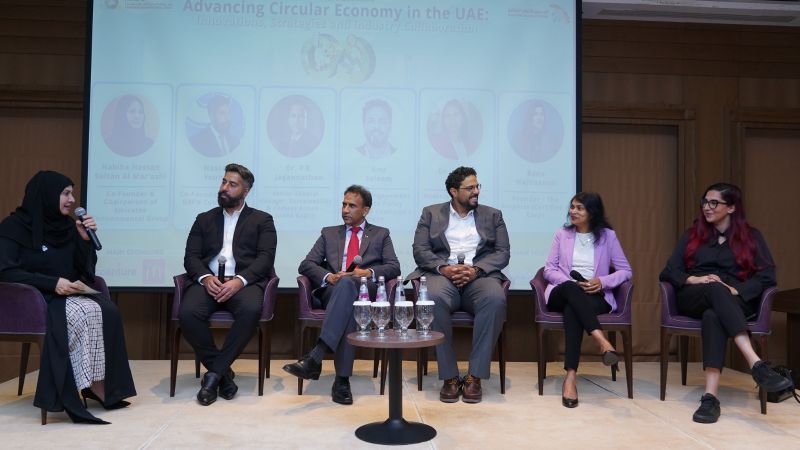A high-level panel discussion in Dubai has brought together policymakers, industry leaders and sustainability experts to accelerate the UAE’s transition towards a circular economy.
Organised by the Emirates Environmental Group (EEG) in co-organisation with the Dubai Supreme Council of Energy (DSCE) and in collaboration with the Advancing Net Zero Volunteering Team, the event carried the theme “Advancing Circular Economy in the UAE: Innovations, Strategies and Industry Collaboration.”
The panel, hosted at the Stella Di Mare Hotel in Dubai Marina, was opened by EEG Co-Founder and Chairperson Habiba Al Mar’ashi, who stressed the importance of circularity as a central pillar of Dubai’s sustainability vision. This was followed by a keynote address from Eng. Faisal Ali Al Rashid, Senior Director at DSCE and Chairman of the Advancing Net Zero Volunteering Team, who highlighted Dubai’s strategic alignment with the UAE’s Net Zero by 2050 vision and the Dubai 2040 Urban Master Plan.
The discussion featured a diverse line-up of speakers, including Hassan Younes of GRFN Consultants, Rana Hajirasouli of The Surpluss, Amr Seleem of UNEP’s Cool Coalition, Dr. Jacinta Dsilva of SEE Institute, and Dr. P.R. Jagannathan of Sobha Realty.
Key themes centred on the urgent need to integrate sustainable practices across industries such as energy, manufacturing, waste management and construction. Speakers explored how policies, technological innovation and behavioural change could collectively drive a systemic shift towards circularity.
Notable initiatives discussed included the Global Cooling Pledge, aimed at reducing emissions and protecting communities from extreme heat, alongside Dubai’s Clean Energy and Net Zero strategies. Panellists argued that circular models could unlock significant economic value while addressing an estimated 45% of global emissions.
The panel also showcased practical solutions, from green building certifications and circular construction to ESG integration and digital platforms repurposing surplus materials for social benefit. Real-world case studies highlighted the power of collaboration between governments, businesses and communities in scaling up impact.
The session concluded with a call for unified action to embed circular principles into national policy, business models and community practices. “Together, we can turn today’s insights into tomorrow’s breakthroughs,” Al Mar’ashi said. “Circularity must move from a policy goal to a lived reality.”
A landmark outcome of the event was the signing of a Memorandum of Understanding (MoU) between EEG and the Advancing Net Zero Volunteering Team, formalising future collaboration on net-zero and circular economy initiatives.
The gathering also featured a lively Q&A session, with contributions from sustainability professionals, students and clean energy entrepreneurs. Among the audience were VIP guests including UN representatives, diplomats and corporate executives.
The event was sponsored by McDonald’s UAE and Accenture Middle East, supported by Stella Di Mare Hotel, and partnered with organisations such as the Arabia CSR Network and the Emirates Green Building Council.
The discussion underscored the UAE’s growing leadership in sustainability and its efforts to link local action with global frameworks, reinforcing long-term resilience through innovation and cross-sector partnerships.

